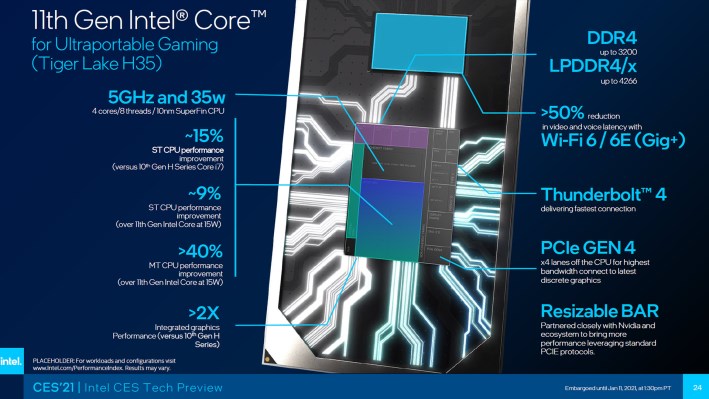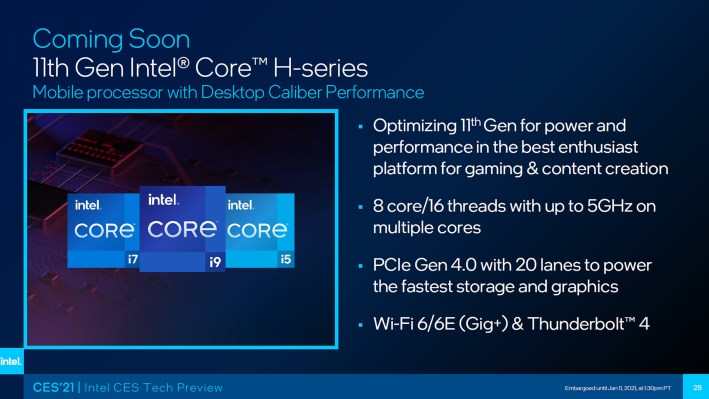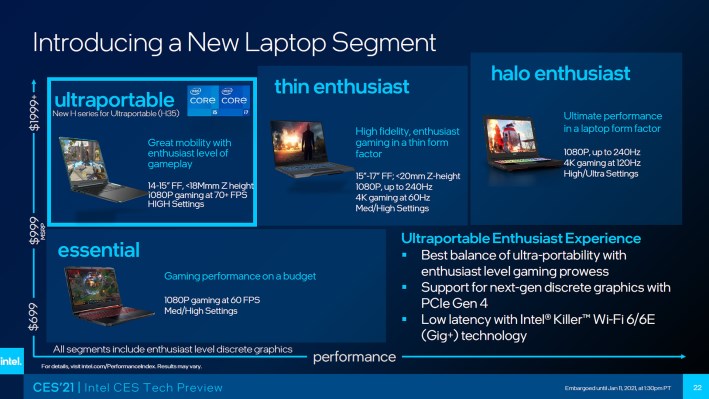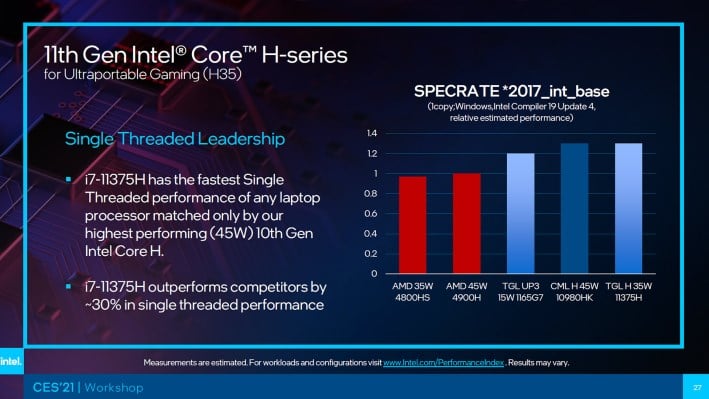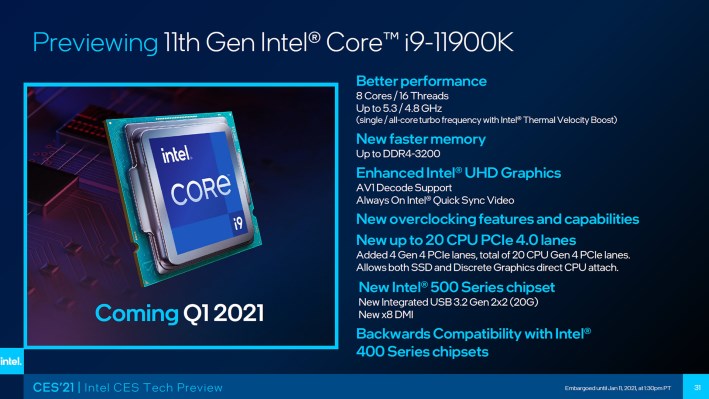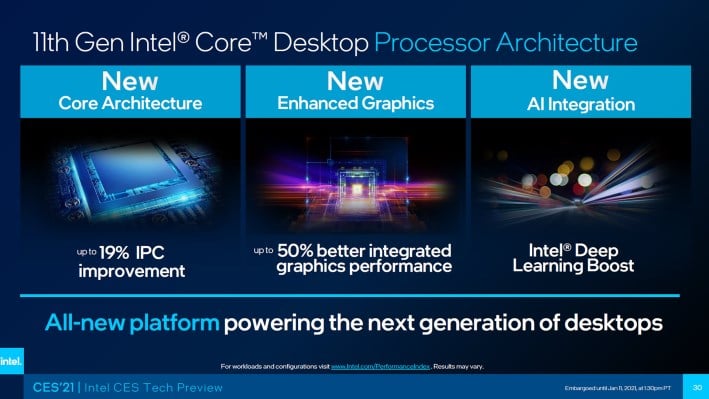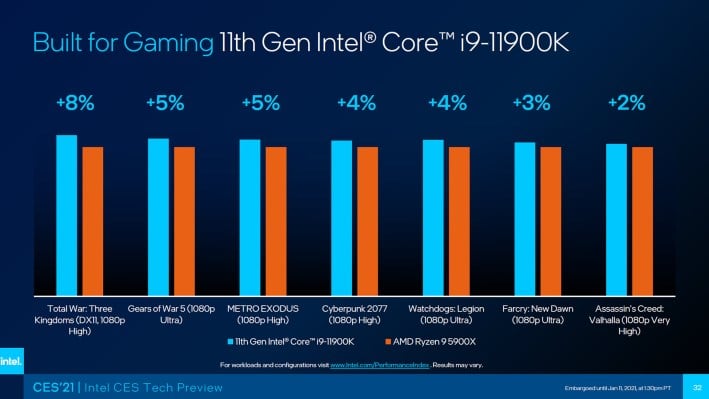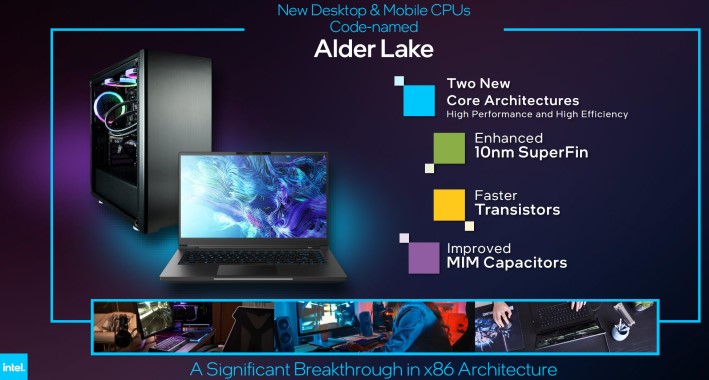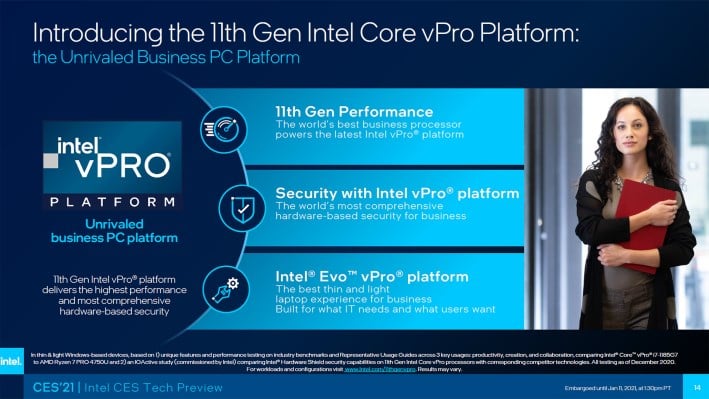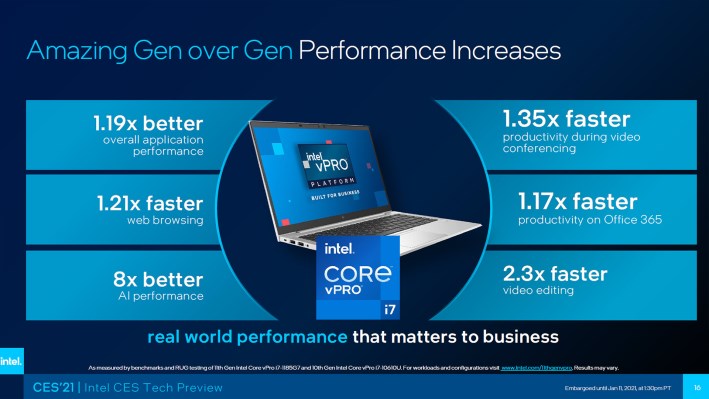Intel Takes Fight To AMD With Bevy Of New Mobile And Desktop CPUs Unveiled At CES 2021
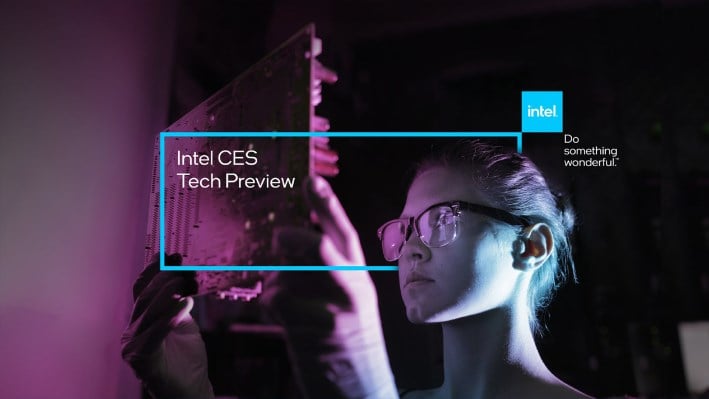
“Only Intel has the breadth of products spanning multiple architectures; the large, open ecosystem; sheer scale of manufacturing footprint; and deep technical expertise customers need to unlock opportunities in this era of distributed intelligence,” Bryant said. “With an intense focus on execution for our core products and across our broader portfolio, we’re introducing a series of leadership products at CES with more following throughout the year.”
11th Gen Intel Core H-Series Mobile Processors For Gaming
Intel’s 10th Gen H-series series mobile processors are nearly ubiquitous in current high-end gaming notebooks at the moment. And Intel is refreshing that lineup with a couple of new Core i7 and Core i5 offerings. With the just-announced 11th Gen H-Series based on 10nm Tiger Lake architecture, Intel is not just upping the ante in terms of performance and features, but also pushing the form factor envelope. In addition to traditional gaming notebook form factors, Intel boasts that the new 11th Gen Core H-Series Tiger Lake H35 parts will appear in high-performance gaming laptops as thin as 16mm – which include next-gen discrete graphics solutions from NVIDIA.At the top of the 11th Gen H-Series stack is the Intel Core i7-11375H Special Edition. The Core i7-11375H SE is a 35W quad-core processor (8-threads), with turbo clocks of up to 5GHz and support for PCI Express 4.0, that’s specifically targeted for ultraportable gaming notebooks. Intel is claiming single-threaded performance improvements in the neighborhood of 15% over previous-gen architectures and a greater than 40% improvement in multi-threaded workloads. The chips will also sport higher-performing Xe-graphics and support DDR4 or LPDDR4X memory at speeds up to 4266MHz. The platform will feature Killer Wi-Fi 6 / 6E, Thunderbolt 4, and support for Resizable BAR as well, thanks to close collaboration with NVIDIA.
Acer, ASUS, MSI and Vaio all announced systems powered by the 11th Gen Intel Core H35-series processor, and Intel is claiming more than 40 designs from its various notebooks partners are all coming in the first half of 2021.
For those that want even more horsepower in their notebook, Bryant also announced an 8-core mobile processor variant leveraging the same architecture as the 11th Gen H-Series that is slated to start shipping a bit later this quarter. The chip’s performance will be comparable to a high-end desktop system according to Intel and offer max turbo clocks as high as 5GHz on multiple cores, with 20 lanes of PCIe Gen 4 connectivity, and all of the aforementioned platform benefits.
11th Gen Rocket Lake-S For Desktops
Notebooks aren’t the only segment getting a performance boost. Intel also revealed some additional Rocket Lake-S and Core i9-11900K details. According to Intel, the upcoming Core i9-11900K – which is due to arrive this quarter – offers a 19% increase in IPC performance over 10th Gen desktop processors in addition to single-core turbo frequencies as high at 5.3GHz (multi-core turbo will hit up to 4.8GHz).Rocket Lake-S is a backport of the 10nm Cypress Cove architecture to the company’s mature 14nm process, so these 11th Gen desktop processors will feature Intel’s latest CPU core architecture, but will be manufactured on the older 14nm process. The move to 14nm required the removal of a couple of cores, however, to keep die sizes in check. Whereas the Core i9-10900K is a 10-core processor, the Core i9-11900K is “only” 8-cores. Due to the IPC and frequency improvements though, Intel is claiming the Core i9-11900K will outperform its previous-gen counterparts. Intel also showed the processor outrunning an AMD Ryzen 9 5900X 12-core processor in a variety of gaming workloads.
Additional features coming with 11th Gen Core desktop processors based on Rocket Lake-S include support for faster DDR4-3200 memory, higher-performance UHD graphics and Intel’s latest media engine with AV1 decode support, Deep Learning Boost, and always-on QuickSync, and 20 lanes of PCIe 4.0 connectivity.
Although 11th Gen Core desktop processors will be backwards compatible with 400-series chipset motherboards, the processors will arrive alongside a new chipset as well. Intel’s 500-series chipset will feature integrated USB 3.2 Gen 2x2 (20G) and a x8 DMI connection between the CPU and PCH with double the bandwidth of the 400 series.
Though actual product details were scarce, Intel also previewed Alder Lake. Intel is calling Alder Lake its “most power-scalable system-on-chip” ever. Alder Lake differs from most of Intel’s current processors in that it packs both high-performance cores and high-efficiency cores on a single product. Alder Lake will also be manufactured using a newer, enhanced version of 10nm SuperFin technology with improved power and thermal characteristics. Alder Lake and its derivatives will be used for both desktop and mobile processors when they arrive later this year.
Chromebooks Get A Performance Boost
In addition to high-performance mobile and desktop processors, Intel also announced new low-power Pentium and Celeron processors destined for the rapidly growing Chromebook space. The new Intel N-series 10nm Jasper Lake Pentium Silver and Celeron processors are based on the current-gen Sunnycove microarchitecture and should offer significantly better performance than their previous-gen counterparts. There are six processors in the initial lineup -- three 10w parts, and three 6w parts...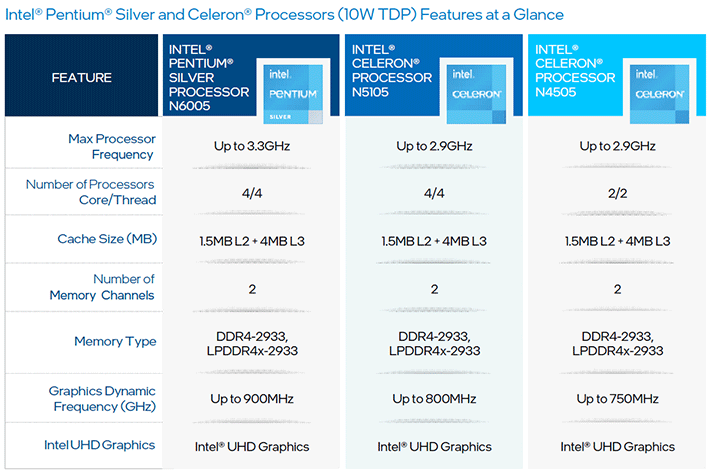
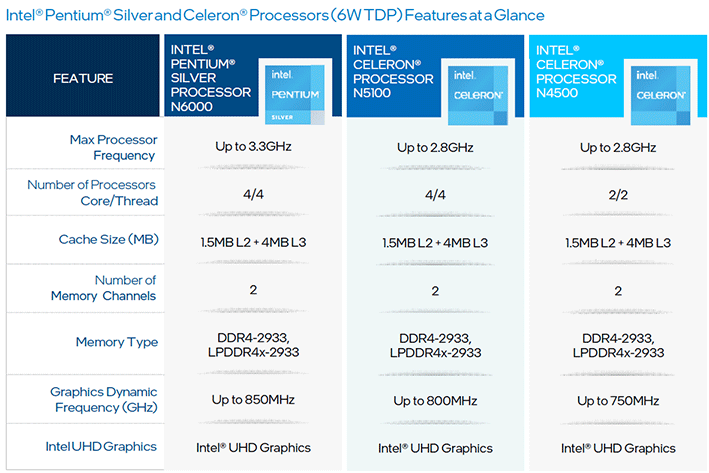
The only thing that changes between the 10w and 6w parts are their frequencies, with the 10w parts offering either higher CPU core clocks (Celerons) or a higher GPU clock (Pentium). Intel Pentium Silver and Celeron processors are available now and will reportedly be offered in over 170 designs.
Business-Class Notebooks Get The 11th Gen vPro Treatment
Intel’s 11th Gen Core mobile processor lineup has also been augmented with the Intel vPro security and manageability platform. Coming with this latest generation of vPro offerings is Intel Hardware Shield, which the company is calling “the industry’s first silicon-enabled artificial intelligence (AI) threat detection to help stop ransomware and crypto-mining attacks”. The 11th Gen vPro platform is also equipped with a feature dubbed Intel Control Flow Enforcement Technology, which can shut down an entire class of attacks called control-flow hijacking. The feature leverages technologies called indirect branch tracking and shadow stack to thwart these attached. Indirect branch tracking defends against jump/call-oriented programming (JOP/COP) attack methods, while shadow stack delivers return address protection to defend against return-oriented programming (ROP) attack methods.
Like their non-vPro, standard counterparts, Intel 11th Gen vPro processors are built using Intel 10nm SuperFin technology, and feature Intel Iris Xe graphics. The platform also supports the latest integrated Intel Wi-Fi 6/6E (Gig+) wireless networking technology.
Intel also launched the Intel Evo vPro platform today, in an effort to bring the same consistency and design innovations permeating the consumer space, into business-class notebooks.
New Ice Lake 3rd Gen Xeons Inbound
Finally, Intel also announced that its 3rd Gen Intel Xeon Scalable processors, code-named “Ice Lake”, have gone into full production.“Today marks a significant milestone for Intel as we continue to accelerate the delivery of our 10nm products and maintain an urgent focus on execution to deliver a predictable cadence of leadership products for our customers,” said Navin Shenoy, executive vice president and general manager of the Data Platforms Group at Intel. “Our 3rd Gen Intel Xeon Scalable platform represents a strategic part of our data center strategy and one that we’ve created alongside some of our biggest customers to reimagine the data center of tomorrow.”
The volume ramp for 3rd Gen Intel Xeon Scalable processors is currently underway.
All told, Intel announced a myriad of products and technologies during its CES 2021, and we didn’t even cover them all here. In any case, it appears that 2021 will be an exciting one on multiple fronts and Intel seems to be fired up and ready for battle.

